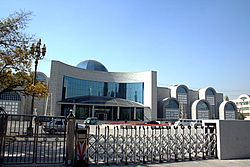新疆博物馆 | |
 | |
 | |
| Location | Urumqi, Xinjiang, China |
|---|---|
| Coordinates | 43°49′10.32″N87°35′02.29″E / 43.8195333°N 87.5839694°E |
The Xinjiang Uyghur Autonomous Region Museum, or Xinjiang Museum, is located in Urumqi, Xinjiang, China. Its address is 581 Xibei Road, Urumqi. [1]
Contents
The museum holds over 40,000 items of various cultural relics and specimens, including 381 national first-grade cultural relics (国家一级文物). In May 2008, the Xinjiang Museum was included in the first batch of the national first-grade museums of China.







